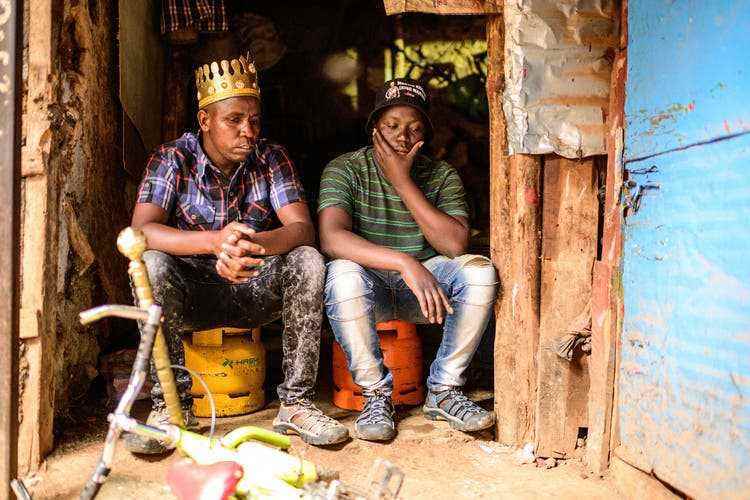Kenya’s election is the most expensive in Africa. Politicians spend huge sums of money to get elected. A candidate in the country’s largest slum has no money – but ideas. Is that enough?
There he is now in the self-built carriage, the king without money. Martin Kivuva, a humble shopkeeper in the slum, holds his scepter in his right hand, a microphone in his left hand, and wears a homemade crown on his head. “Speak, speak to your people,” shouts the animator, walking alongside the carriage, which is pulled by a small Mazda.
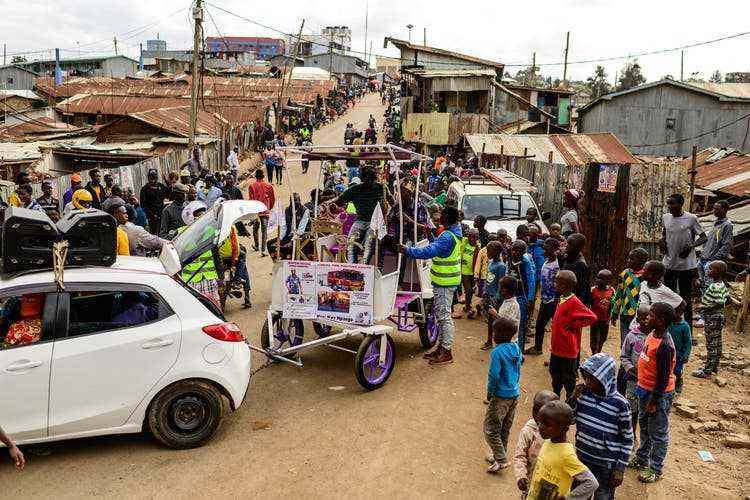
A small Mazda pulls Martin Kivuva’s carriage through Kibera.
And King Martin speaks to the people who may or may not vote for him. “Here with us poor people there are many problems, really many problems. But I understand them, because I’m one of you.”
The microphone squeaks, children and adults wave, cheer and applaud. A vegetable vendor bursts out laughing when she recognizes the man who usually sells soft drinks two blocks away.
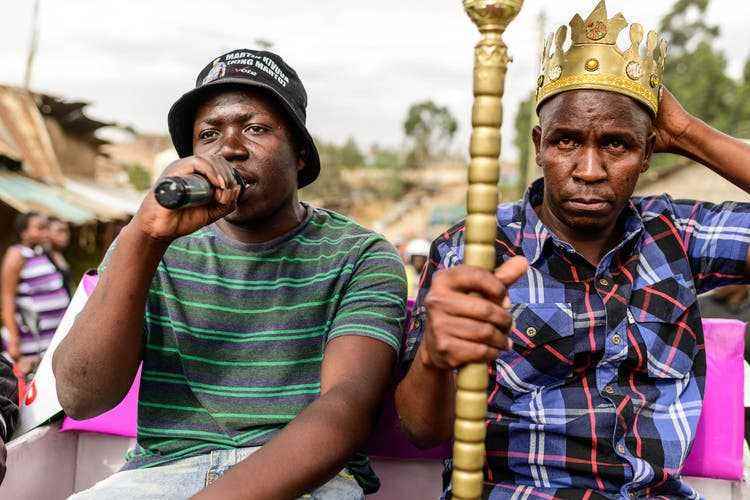
The king on his carriage.
Martin Kivuva’s first campaign rally starts off well. It doesn’t matter that a few minutes earlier the generator that supplies the loudspeaker with electricity had not started. It also doesn’t matter that Kivuva’s campaign manager doesn’t participate because Kivuva can’t pay him the wage he is asking for. For a few minutes, Martin Kivuva, shopkeeper and candidate for Nairobi’s regional parliament, is actually the king of the quarters – the character he invented for this campaign.
But that doesn’t change the fact that candidate Kivuva has a problem: on election day in Kenya, only the rich are crowned.
Cost of the election: more than a billion dollars
Kenya votes on August 9th. It is probably the most important election in Africa this year. Because unlike in many African countries, the winners are not certain in advance. And because Kenya, a country with 55 million inhabitants, is a regional heavyweight, it’s not just African countries that look when Kenya votes.
Kenya votes on August 9th. It is probably the most important election in Africa this year. Because unlike in many African countries, the winners are not certain in advance. And because Kenya, a country with 55 million inhabitants, is a regional heavyweight, it’s not just African countries that look when Kenya votes.
But Kenya’s democracy is all about money, even in poor Kibera. According to estimates, the election will cost over a billion dollars. It is likely to be the most expensive per capita that has ever taken place in Africa. Candidates spend money to rent helicopters, to print thousands of posters, to pay volunteers, to bribe voters.
Martin Kivuva can’t afford helicopters or bribes. His budget for the first day of the election campaign is 10,000 shillings, the equivalent of 80 francs.
According to study According to Kenyan democracy researchers, the candidates who enter the national parliament on August 9 will have spent an average of $222,000. A seat in the Nairobi regional parliament is cheaper, but even that costs a candidate $31,000. Most of it is private money, and there is hardly any support from political parties.
Martin Kivuva doesn’t get the money even if he begs all his relatives and friends. He earns between 4 and 8 francs a day with his shop.
He doesn’t convince his wife
An hour before it starts, Martin Kivuva is leaning in the entrance of his shop. It’s a two-storey building made of corrugated iron bolted together. Gas cylinders are piled up in front of the entrance, and inside there are crates. Dozens of election posters, including Kivuva’s, are stuck to the walls in the alley. It shows him with a crown, scepter and a determined look.
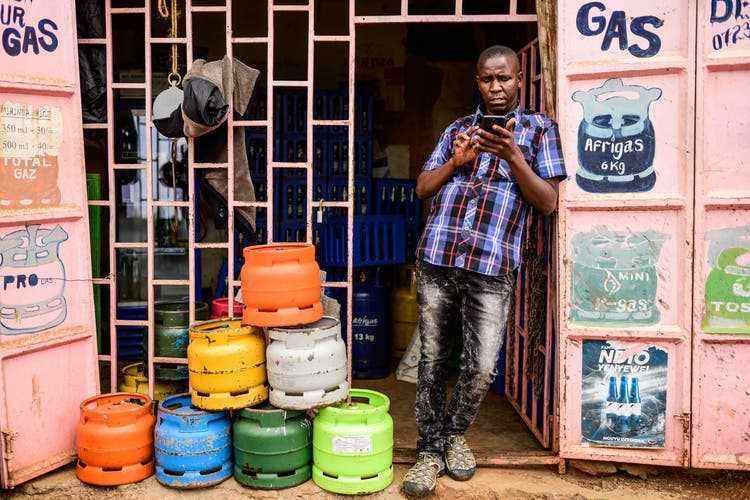
Martin Kivuva earns four to eight francs a day in his shop.
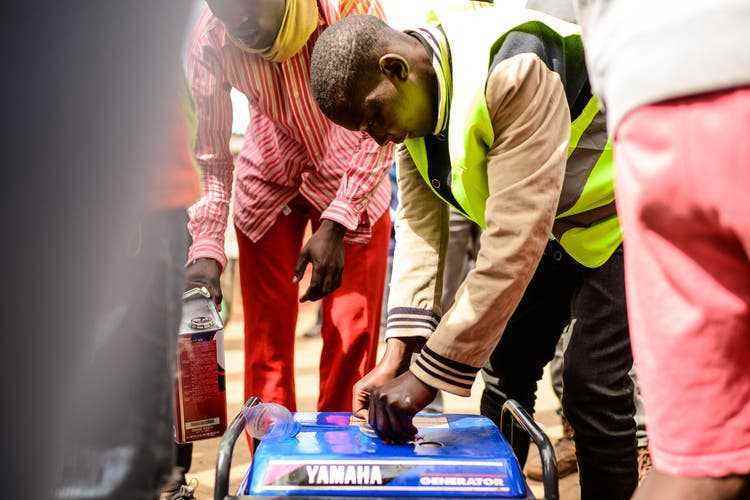
The generator, which is supposed to make the campaigner’s microphone work, does not start at first.
“Our political leaders have no idea how to solve the country’s problems,” says Kivuva. “I have the ideas, but I lack the resources.” Kivuva is convinced that Kenya’s politicians really need people like him. “I’ve seen people suffer and suffered myself.” He is 34, his father died when he was two years old, he earned his first money selling shoes. He says: “I know how to use 10 shillings sensibly.”
Kivuva can talk like a politician. He doesn’t convince his wife. She was against his candidacy. She fears he is wasting what little money they have.
Kivuva believes it can make up its deficit. He says: “I reduce the costs of the campaign through creativity.” By forming his own brand: King Martin. The man with the crown, the scepter and the homemade carriage.
Shortly after 3 p.m. on this Saturday, the carriage starts rolling. Helpers on motorcycles honk the way. Chickens flee, children jump to the music from the speakers. The animator shouts:
“Only King Martin can lead us!”
“King Martin will intercede for the boys.”
“Everyone out to the August election, vote for King Martin!”
Martin Kivuva stands in his carriage and waves to the crowd and laughs and shakes his sceptre.
King Martin has ideas but no money
Kivuva is not a clown. He’s a serious man who speaks softly and rarely laughs when he’s not campaigning in a carriage. And he has ideas. His manifesto contains four projects tailored to Kibera’s problems. First: a fund for the education of young mothers. Second: a fire department depot to put out the many fires in the district. Third: a job center for unemployed young people. Fourth: a forum that coordinates the activities of the non-governmental organizations in the district.
Kenya’s democracy is rarely about content. Instead it’s about people and money. Mostly about money. The two leading presidential candidates, Raila Odinga and William Ruto, have presented programs that are similar and tell how they intend to allocate money. For example, small loans for the millions of poor who suffer from high food prices.
After campaign events, participants often line up to be rewarded with a few shillings. In Kibera, beaming candidates strut through the streets and hand the vegetable vendor a banknote as she passes. Or delivery vans cart a load of wheelchairs into the district, with which a candidate shows his heart for the disabled.
In a elevation Kenya’s MPs explained what they see as their most important task: to support the voters financially.
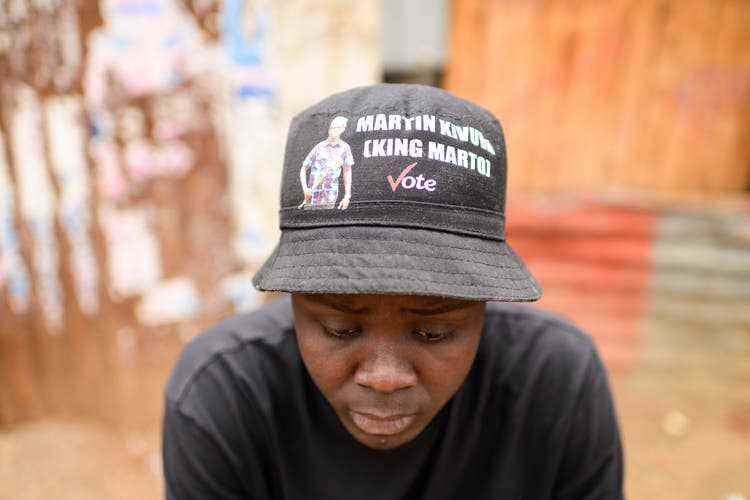
Martin Kivuvu is hoping for young supporters – like his animator here.
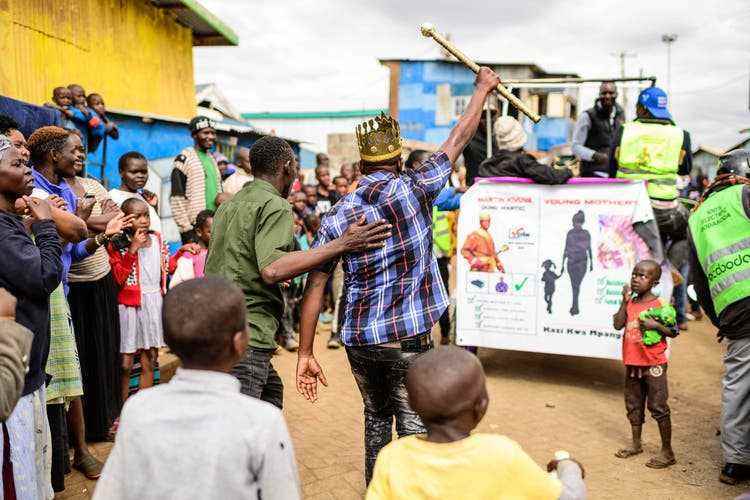
The king just before the start of the tour.
Voters see it that way too. Most don’t measure their MPs by what laws they pass, but by what health centers they inaugurate or by how many schoolchildren they personally assist. Kenya’s politicians are more patrons than representatives of the people. As a result, many of them do not have any pangs of conscience when they help themselves from government pots.
How far away Martin Kivuva is from these pots, he gets to feel when his convoy digs through alleys that are no longer in his immediate vicinity. The further away, the less laughter and thumbs up in the audience. But skeptical looks and frowns. The carriage drives faster, sometimes the king has to hold on to keep his balance.
Two women stand between food stalls on the side of the road. “We need money,” shouts one in the direction of King Martin. “We’re hungry,” calls the other and grabs her stomach with both hands.
King Martin heard her: “If I give you 50 shillings, they won’t help you. You need real change.”
The two women are unmoved.
300 meters away, a woman and a man in front of a beauty salon, they too unmoved. “Why is he only coming now, three weeks before the election?” asks the woman. “People have already made their decision.” The man: «These poor candidates are useless. They don’t want to go to parliament to work, they want to steal.”
There is a widespread belief that the wealthy are better candidates. In fact, there is no evidence that wealthy MPs behave particularly ethically. Even for them, the election campaign is so ruinous that they have to get their finances back on track in office. Martin Kivuva has an account of this: “There are 32,500 voters in this constituency. The winner gets maybe 12,000 votes. If he has given each of these voters 200 shillings, that makes two and a half million (20,000 francs). He will spend the first time in office trying to recoup that money.”
It helps that parliamentarian salaries in Kenya are among the highest in the world. A national representative earns around $10,000 a month, and a regional representative between $1,700 and $3,000. That’s ten times what Martin Kivuva is earning right now.
It also helps that even regional MPs become part of patronage networks that award contracts from state-owned companies, for example. When Kenya’s politicians make deals, it’s usually not about laws. But about business.
Actually, Kenya would have one Law of 2013, which regulates campaign finance. But it is not implemented. In August 2021, Parliament blocked a proposal by the state electoral commission to set caps on campaign spending. It is no coincidence that some of Kenya’s biggest financial scandals have involved campaign finance.
Kenya is a democracy where those who have money spend it in election campaigns only to recoup it later and spend it again in the next election. Outsiders don’t just get in there. There’s a term for it: oligarchy, the rule of the few.
The Next Generation of Kenyan Democrats
There is little evidence that Martin Kivuva will ever be one of Kenya’s oligarchs. But on this Saturday afternoon, shortly before the big election, he is king, at least in his quarters. The closer his entourage gets to his alley, the more exuberant the mood. The carriage makes its way past hairdressers, laundresses and bar owners. Now they laugh and cheer again, and the king waves his scepter.
Children have gathered behind the carriage, the crowd is getting bigger. They run and hop, stumble and nearly knock over a fishmonger’s table.
Then the convoy turns into Martin Kivuvas Street, where his small shop is located, which brings in a few francs every day. “There is only one king,” the animator’s voice sounds out of the speakers one last time, “and that’s King Martin!”
«King Martin! King Martin! King Martin!” shouted the crowd.
Kings are not elected, Martin Kivuva knows that. And yet here is his kingdom, here people like him even though he is poor. «King Martin! King Martin! King Martin!” The children shout the loudest. They are the next generation of Kenyan democrats. Will they elect politicians who have ideas instead of money?
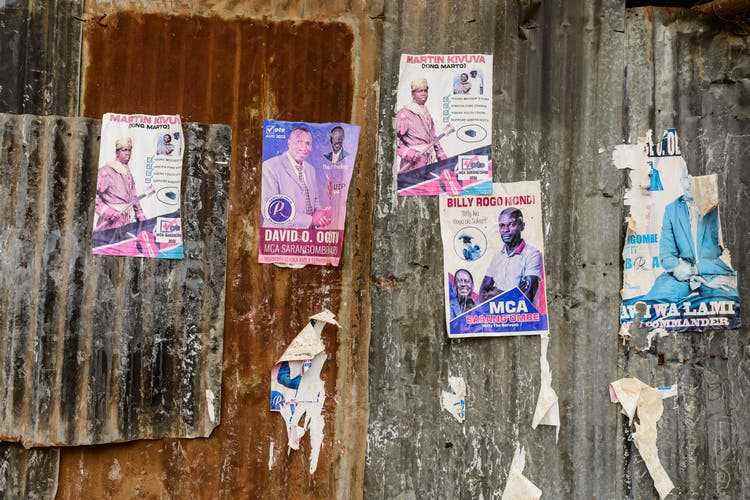
Campaign posters in Martin Kivuva’s alley.
